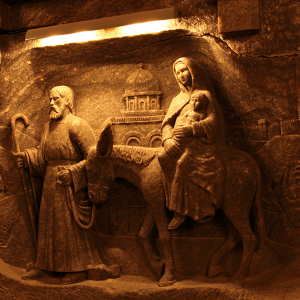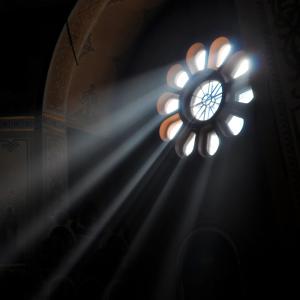
January is hard. Epiphany offers light.

IMAGINE YOURSELF IN a darkened theater. At center stage sits a woman, child on her lap, both wrapped in tonal greys. A tiny stream of light falls from above. Off left, large animals shift their weight on floorboards, chuff-chuffing their breath; foreign tongues murmur them calm. Off right, the only sound is of metal rasps running repeatedly down the length of blades; random sparks flare off the cutting teeth. This is Epiphany. Everything is waiting to happen. We know the narrative detail: Mary and Jesus, a manger, the Magi’s star-trekking journey with camels and gifts to honor a “newborn king” (while Herod, like Pharaoh, plots a bloody offense). But Epiphany is a season for paradigm shifts. What if we scramble the details? Imagine this. Off left, the chuff-chuffing of foreign tongues come not from men calming beasts, but camels praying as they approach the child, the spiritual waterhole for the world. The camels have not brought kings or astrologers, but a guild of bakers, who extend platters of fresh bread toward the child. At center, the woman wrapped in a cloak of ultraviolet leans back on her stool: She has given birth to a star, filling them both with light. At her side stands a human child. He gazes off right. The sound of rasps and swords, boots and shouted commands fascinate him. Slowly, the child lets go his mother’s hand, relaxes his throat muscles, measures his breath. In a world of bread and circuses, he has made brothers of soldiers. He is a sword-swallower and eats their pain.
May God cause us to cry out to those mountains of injustice, "Oh freedom!"

In the dark days of Advent, we wonder when the birth pangs will end: Will light break into the darkest corners of our hearts, our families, our lives? Will God—can God—take the twisted sinew of our warped world and redeem it? Will we—can we—hold on through the night? Can we trust that light to come? These are the questions of Advent.
As we enter the season of Epiphany, new questions arise: Will we allow the light that has broken forth to illuminate the darkest corners of hearts, our families, and our lives? Can we—will we—follow Jesus as he untwists the mangled metal of our shattered souls ... and redeems it? Can we—will we—trust the light or will we hide from it? These are the questions of Epiphany.
The light of Epiphany illuminates in two directions: It flashes inward, revealing our twisted and fragmented souls, and it flashes outward, revealing the carnage and consequences of the lies our world has embraced and used to craft public policy, the lies we have believed and reinforced through our complicit acceptance, and the truth we must speak.
As we enter 2013, we look back and see that over the past four years much public good was done. Remember: The Lilly Ledbetter Fair Pay Act made it easier for women to fight pay discrimination. Remember the drama when Congress passed the Affordable Care Act and the Supreme Court upheld it, creating a path for tens of millions of Americans to finally receive health care. Remember the image of the last troops leaving Iraq.

Late last week, the White House announced new enforcement measures at the U.S.-Mexico border. Among other things, these measures expand the pathway for migrants from Haiti, Cuba, and Nicaragua to receive two years of legal entry if they have an eligible U.S. sponsor — and allow the administration to expedite removal of migrants from these nations who cross into the U.S. from Mexico without documentation. It’s unclear what the full human impact of these measures will be, but when I read the news, my heart broke for those whose pathway to safety just slipped even further out of reach.
Reflections on the Revised Common Lectionary, Cycle A

A NEW CALENDAR YEAR marks the end of the Christmas season and a shift to the season of Epiphany that spotlights the reality of the Incarnation. In sync with our personal promises to discontinue bad habits in favor of better practices, the lectionary readings capture familiar expressions of vocational clarity and ministerial frustration. The season is a mosaic of self-examination peppered with moments of great light penetrating the darkest despair. Whether ancient Israel (living in exile in the sixth century B.C.E.), the followers of Jesus (in the first century C.E.), or 21st century seekers of spirituality without religion, the description is the same: The disenfranchised, disappointed, and divided discover a glimpse of the reign of God.
Read these texts as snippets of ancient social media: status updates of a prophet, blogs about the ministry of Jesus, and PDF files about early church practices. Each exposes the light of God pushing into the darkness of human existence: frustrated ministers, radical promises of forgiveness, reports of flourishing charismatic leaders, stalemated efforts due to divided affiliations, petitions for lawmakers to practice impartiality, and the death of one imprisoned on suspicious testimony. Familiar, jarring, and too often tamed, these texts deserve at least the attention afforded public policy debates and celebrity rumors.
A close reading of the text does not lend safety by avoiding the prophet, ignoring John’s message, or disputing baptism rituals. Every baptized believer is called to arise and live as if the kingdom of God has come.
Reflections of the Revised Common Lectionary, Cycle B

IF WE FOLLOWED the church calendar and celebrated Epiphany in January, we wouldn’t have to cram the wise men into the crèche to compete with the shepherds. We could save all the “Star of Bethlehem” songs to brighten the cold days of January. Obviously, the magi needed a few weeks to prepare and then travel “from the East.”
A new bright object in the sky was certainly an “epiphany,” but it was not totally unexpected. These magi were astrologers, the ancient astronomers of their day. To the east of Jerusalem lay Babylon, birthplace of astrology and location of a large Jewish community. The discovery of two astrological books among the Dead Sea scrolls showed that the sign of Aries the Ram in the zodiac represented the reign of Herod the Great in Judea. Since Herod was aging, it is not surprising that Jewish astrologers were watching this royal constellation.
In a television series called Jesus: The Complete Story, astronomer Michael R. Molnar notes an unusual astrological conjunction on the night of April 17, in 6 B.C.E., the year Jesus was most likely born. At that time, both Saturn and the sun were in the constellation Aries, and then the moon eclipsed to reveal Jupiter, king of the planets, also in Aries. Jupiter shone into the dawn, another auspicious sign of royalty. It was confirmation enough to send these astrologers on their way.
Perhaps if we celebrated Epiphany after Christmas, we’d have more time to learn about this epiphany and its remarkable interpretation.

GIVEN THAT WE'VE ALL just had a face full of Christmas lights, most folks would be surprised to learn that in the church, Epiphany is traditionally the season of light (not lights—you can put them away). Epiphany is designed to put us in the position of those who first met Jesus on whom light slowly dawns. What? You mean the carpenter’s son, Mary’s boy? He’s the one to redeem Israel and bring justice to every last human being on earth?! There is so much light here it is hard to see all at once. Epiphany acts as a light dimmer, waiting for our eyes to adjust, trying to keep us only slightly uncomfortable, but not overwhelmed.
Some churches have a practice of announcing a sermon series for January that can attract new people—something on sex or politics, for example. Advertise it at Christmas and then deliver with your best in the new year. That’s when folks are open to new things, and best of all for us, God illumines us at Epiphany. Learning who God is throws light on who our neighbor is—one in whom divine light shines, who is therefore endlessly deserving of our respect and adoration.

